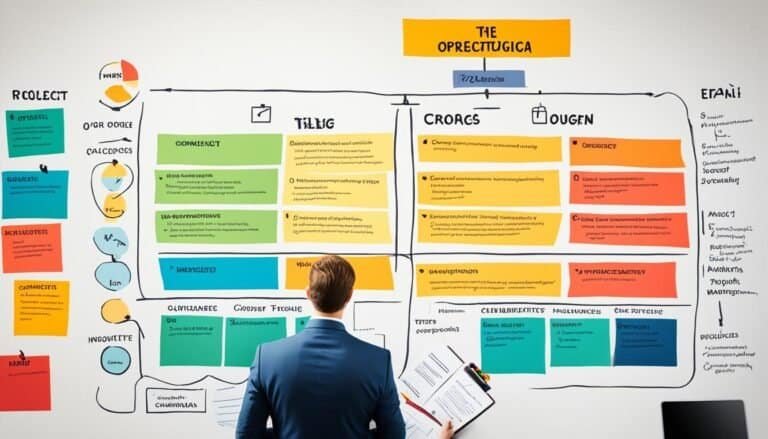Top Interview Questions for Office Managers
Office managers play a vital role in coordinating the operations of an office. To ensure a successful hiring process, it is important to ask the right interview questions. Here are some top interview questions for office managers that can help assess their organizational skills, communication abilities, problem-solving capabilities, and more.
Key Takeaways:
- Asking the right interview questions is crucial for evaluating office manager candidates.
- Assess their organizational skills, communication abilities, problem-solving capabilities, and more.
- Ask about their time management, software proficiency, and adaptability.
- Evaluate their leadership, team management, and ability to maintain confidentiality.
- Consider their self-management systems and attention to detail.
Organizational Skills and Time Management
Effective organizational skills and time management are essential qualities for office managers. To ensure that candidates possess these crucial abilities, consider asking the following interview questions:
- “Can you describe your approach to planning and prioritizing tasks in a fast-paced office environment?”
- “How do you handle multiple responsibilities and ensure that everything gets completed on time?”
- “What strategies do you use to keep track of schedules and deadlines?”
By asking these questions, you can gauge an office manager’s proficiency in organizing workflows, managing time efficiently, and meeting deadlines. Furthermore, their responses will provide insights into their prioritization methods and ability to handle a high volume of tasks.
Strong organizational skills and efficient time management contribute to a productive work environment, reducing stress and ensuring that projects and daily operations run smoothly. It is imperative for office managers to establish effective systems and strategies for task management, schedule coordination, and deadline adherence.
Image:
Benefits of Excellent Organizational Skills and Time Management
“Organizational skills and time management are critical for office managers as they directly impact productivity, efficiency, and overall office functioning. With exceptional organizational skills, office managers can create efficient workflows, reduce errors, and ensure deadlines are met. Effective time management allows office managers to prioritize tasks, allocate resources appropriately, and minimize unnecessary delays. By assessing candidates’ organizational skills and time management during interviews, organizations can build teams that consistently deliver high-quality work and meet operational goals.”
| Benefits of Organizational Skills | Benefits of Time Management |
|---|---|
|
|
Technical and Software Proficiency
As an office manager, having strong technical skills and software proficiency is essential in today’s digital workplace. The ability to work effectively with various software and technology tools can greatly enhance your productivity and streamline office operations. During the interview process, it’s important to assess a candidate’s technical abilities and their familiarity with commonly used office management programs.
Familiarity with Common Office Management Programs
Ask the candidate about their experience with software programs such as Microsoft Office or Google Drive. These programs are widely used in offices for tasks like document creation, spreadsheet management, and email communication. Inquire about their proficiency with these tools, including their knowledge of advanced features and shortcuts that can help improve efficiency.
Additionally, find out if the candidate has experience working with other software applications that are specific to your organization or industry. This could include project management tools, customer relationship management (CRM) software, or any other software platforms that are crucial for office management in your company.
Willingness to Learn New Programs
In today’s fast-paced business environment, technology is constantly evolving. Therefore, it’s important to gauge a candidate’s willingness to learn new programs and adapt to changing technologies. Ask them about their experience in quickly picking up new software and their ability to troubleshoot technical issues independently.
Office managers who are open to learning new programs and technologies demonstrate a growth mindset that can greatly benefit the organization. Their ability to adapt and embrace new tools ensures that the office stays up-to-date with the latest advancements and remains competitive in the market.
Key Points:
- Assess the candidate’s familiarity with common office management programs like Microsoft Office or Google Drive.
- Inquire about their proficiency with these tools, including their knowledge of advanced features and shortcuts.
- Ask if they have experience with other software applications specific to your organization or industry.
- Evaluate their willingness to learn new programs and adapt to changing technologies.
A candidate’s technical skills and software proficiency are crucial factors in determining their suitability for the role of office manager. By thoroughly assessing their abilities and willingness to learn, you can find a candidate who can effectively utilize technology to streamline office operations and enhance productivity.
Communication Skills and Interpersonal Abilities
Effective communication is a crucial skill for office managers, as they interact with a diverse range of people on a daily basis. Assessing a candidate’s communication skills, both written and verbal, during an interview can provide valuable insights into their ability to convey information clearly and concisely, as well as their capacity to actively listen and understand the needs of others.
When interviewing candidates for an office manager position, consider asking the following communication-related questions:
- Describe a situation in which you had to effectively communicate complex information to a team. How did you ensure that everyone understood the message?
- Give an example of a time when you encountered a challenging conversation or conflict. How did you handle it and what was the outcome?
- How do you adapt your communication style when dealing with individuals from different backgrounds or with varying levels of expertise?
By asking these questions, you can gain insights into a candidate’s interpersonal abilities as well. Office managers often serve as mediators, resolving conflicts and fostering positive relationships among team members. Therefore, it’s important to assess a candidate’s ability to build rapport, collaborate effectively, and maintain professionalism in challenging situations.
Remember to observe non-verbal cues during the interview as well, such as eye contact, body language, and overall demeanor. These can provide additional insights into a candidate’s communication and interpersonal skills. For a complete evaluation, consider using behavioral-based questions that require candidates to provide specific examples of their past experiences and how they handled communication challenges.
Good communication is the cornerstone of effective office management. Office managers must excel in expressing themselves clearly, listening actively, and ensuring that their message resonates with individuals at all levels of the organization.
Problem-Solving and Adaptability
When interviewing candidates for the office manager position, it is crucial to assess their problem-solving abilities and adaptability to changing circumstances. Office managers are often faced with various challenges that require quick thinking and effective solutions. By asking the right interview questions, you can evaluate their problem-solving skills and their ability to think on their feet.
Here are some office manager interview questions that can help you assess problem-solving and adaptability:
- Tell me about a time when you encountered a complex problem at work. How did you approach it, and what steps did you take to resolve it?
- Give me an example of a situation where you had to adapt quickly to unexpected changes in your work environment. How did you handle it, and what was the outcome?
- Describe a scenario where you had to deal with a difficult client or colleague. How did you handle the situation, and what was the result?
- Can you share a time when you had to make a tough decision with limited information? How did you gather the necessary information and come to a conclusion?
- Have you ever had to implement a new process or system to improve efficiency in the office? How did you approach the implementation, and what challenges did you face?
These questions will not only help you assess their problem-solving skills but also their ability to adapt to different situations and find effective solutions. Look for candidates who demonstrate creativity, critical thinking, and a proactive approach to problem-solving.
| Problem-Solving Abilities | Adaptability |
|---|---|
| Ability to identify and analyze problems | Willingness to embrace change |
| Creativity in finding solutions | Flexibility in adjusting to new situations |
| Effective decision-making | Ability to handle uncertainty |
| Resourcefulness in finding information or resources | Quickly adapting to unforeseen circumstances |
By evaluating the problem-solving and adaptability skills of office manager candidates, you can ensure that you hire someone who can effectively overcome challenges and contribute to the success of your office.
Leadership and Team Management
Office managers often play a crucial role in leading and coordinating teams. Evaluating their leadership skills, ability to motivate and inspire team members, and approach to managing projects and delegating tasks is essential in the hiring process. Here are some key office manager interview questions that can help assess their leadership and team management abilities:
1. How do you motivate your team members to achieve their goals?
Effective leaders understand the importance of motivating their team members. Look for candidates who emphasize building positive relationships, providing support and recognition, setting clear goals, and fostering a collaborative work environment.
2. Can you share an experience where you successfully resolved conflicts within your team?
Conflict resolution is a critical skill for office managers. Look for candidates who can demonstrate their ability to address conflicts calmly and objectively, mediate between team members, and find mutually beneficial solutions.
3. How do you delegate tasks to ensure the efficient functioning of your team?
Delegation is key to effective team management. Look for candidates who can explain their process for assessing team members’ skills and assigning tasks accordingly, while also providing guidance and support throughout the process.
4. Have you implemented any strategies or initiatives to improve team collaboration and productivity?
Collaboration and productivity are important factors in team success. Look for candidates who can share specific strategies they have implemented, such as team-building activities, regular check-ins, or tools that enhance collaboration and efficiency.
5. How do you handle underperforming team members?
Dealing with underperformance is a common challenge for managers. Look for candidates who can describe their approach to addressing performance issues, such as providing constructive feedback, offering coaching or training opportunities, or implementing performance improvement plans.
Tip: When evaluating candidates’ responses, consider their ability to communicate effectively, inspire trust and respect, and demonstrate a genuine interest in the success and development of their team members.
By asking these office manager interview questions, you can gain valuable insights into a candidate’s leadership and team management skills. Remember to tailor these questions to align with your organization’s specific needs and values.
Confidentiality and Discretion
When hiring an office manager, it is crucial to assess their understanding of the importance of confidentiality and their ability to exercise discretion. Office managers handle sensitive and confidential information on a regular basis, ranging from financial records to employee personal details.
Confidentiality entails respecting and safeguarding this information, ensuring that it is not disclosed to unauthorized individuals. Office managers must have a clear understanding of what constitutes confidential information in their specific work environment and demonstrate a commitment to maintaining its privacy. This includes not discussing sensitive matters outside of work and taking precautions to prevent unauthorized access.
Discretion goes hand in hand with confidentiality. Office managers should possess the ability to handle sensitive situations tactfully and avoid unnecessary disclosures. In their role, they may come across information that requires careful consideration and judgment. Their ability to maintain discretion demonstrates professionalism and enhances trust within the organization.
During the interview process, consider asking office manager candidates the following questions to assess their aptitude in maintaining confidentiality and exercising discretion:
- Can you describe a situation where you had to handle confidential information? How did you ensure its confidentiality and privacy?
- How do you define confidentiality in the workplace? What steps do you take to maintain it?
- Can you provide an example of a time when you had to exercise discretion in a challenging situation?
- What measures do you take to protect sensitive data from unauthorized access?
“Confidentiality is of utmost importance when it comes to managing an office. Our clients and employees trust us with their private information, and it’s our responsibility to ensure its confidentiality.”
By evaluating a candidate’s responses to these interview questions, you can better understand their attitude towards confidentiality and discretion. Look for candidates who demonstrate a strong understanding of the importance of confidentiality, possess practical strategies for upholding it, and exhibit a commitment to maintaining the privacy of sensitive information.
Case Study: Maintaining Confidentiality and Discretion in a Medical Office
In a medical office setting, maintaining confidentiality and discretion is even more critical due to the nature of the information handled. Patient medical records, test results, and other personal data must be protected at all costs. Office managers in healthcare institutions should demonstrate an exceptional understanding of the legal and ethical responsibilities surrounding patient privacy.
They must be aware of relevant regulations, such as the Health Insurance Portability and Accountability Act (HIPAA) in the United States, and ensure compliance with these guidelines. Implementing secure systems for handling confidential information, training staff on privacy protocols, and regularly reviewing data protection processes are essential in safeguarding patient confidentiality
Self-Management and Organizational Systems
Successful office managers excel in self-management and employ effective organizational systems to ensure smooth operations. During the interview process, evaluate candidates’ ability to stay organized, prioritize tasks, and maintain attention to detail. Explore their preferred organizational methods, such as to-do lists or calendars, to gauge their suitability for the role.
Here are some office manager interview questions related to self-management and organizational systems:
- How do you prioritize your tasks and manage your time effectively?
- What tools or systems do you use to stay organized and ensure nothing falls through the cracks?
- Can you describe a situation where you had to handle multiple deadlines and how you managed them?
- How do you maintain attention to detail in your work?
- Do you have any strategies for managing interruptions or unexpected tasks that arise throughout the day?
- Are you comfortable using digital tools, such as project management software or task management apps, to streamline your work?
By asking these office manager interview questions, you can assess candidates’ self-management skills and their ability to implement effective organizational systems that contribute to the overall efficiency of the office.
| Benefits of Strong Self-Management and Organizational Systems | Impact on Office Efficiency |
|---|---|
| 1. Improved productivity | 1. Streamlined workflows |
| 2. Reduced stress and overwhelm | 2. Timely completion of tasks and projects |
| 3. Enhanced time management | 3. Effective coordination and allocation of resources |
| 4. Fewer errors and mistakes | 4. Efficient handling of administrative tasks |
| 5. Improved organization and structure | 5. Proactive problem-solving and conflict resolution |
Conclusion
By asking the right interview questions, you can effectively evaluate the skills and qualifications of office manager candidates. These interview questions allow you to assess their organizational skills, communication abilities, problem-solving capabilities, and more. With a thorough interview process, you can find the ideal office manager who will contribute to the smooth functioning of your office.
Preparing for office manager interviews requires careful planning and research. Here are a few tips to help you conduct successful interviews:
- Review the job description: Familiarize yourself with the specific requirements and responsibilities of the office manager role to tailor your questions accordingly.
- Create a structured interview format: Develop a list of key interview questions, ensuring a mix of behavioral, situational, and technical queries to gain a comprehensive understanding of the candidate’s abilities.
- Consider a panel interview: Involving multiple team members in the interview process allows for different perspectives and a more well-rounded evaluation.
- Use role-playing scenarios: Present candidates with hypothetical situations that they may encounter as an office manager to assess their problem-solving skills and ability to handle challenges.
- Follow-up with references: Contact the candidate’s references to gain additional insights into their past performance and work-related strengths.
By employing these strategies and utilizing the recommended interview questions, you can ensure a thorough and effective interview process to select the most suitable office manager for your organization.







